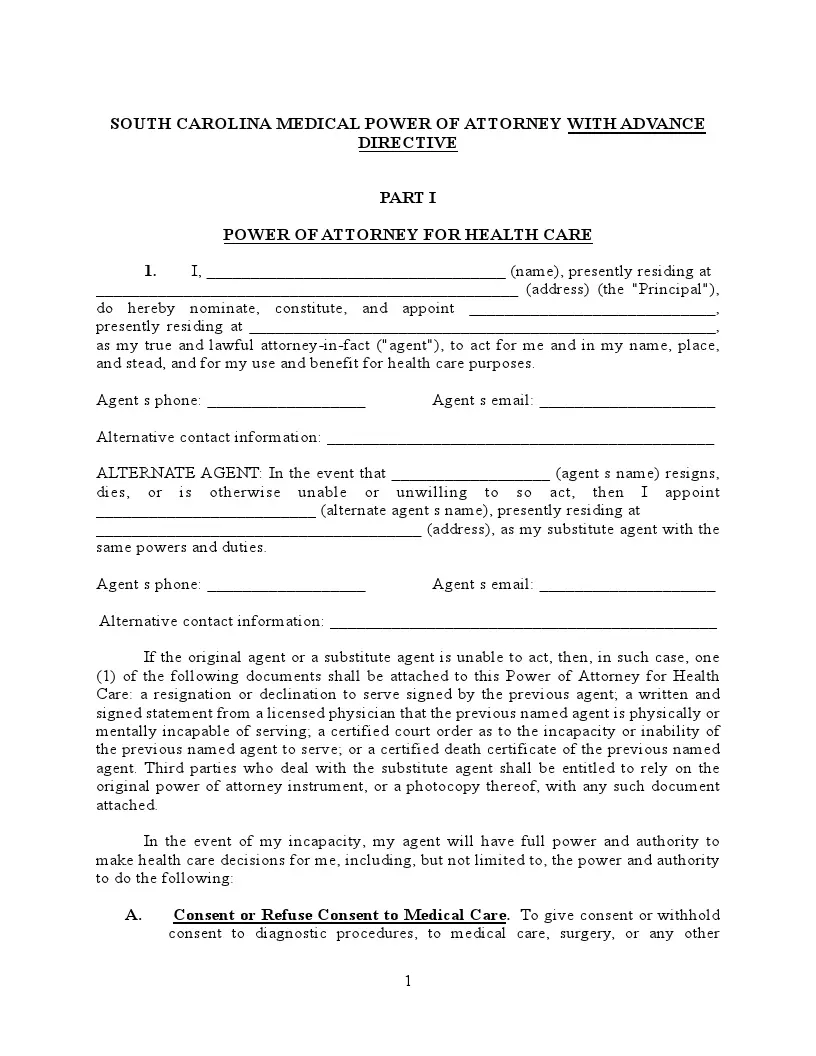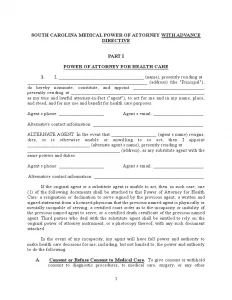South Carolina Medical Power of Attorney (POA) Form
A Medical Power of Attorney or, as introduced in South Carolina, Health Care Power of Attorney certificates serve to create an extra layer of confidence that one’s therapeutic preferences will be completed in case the patient becomes physically or mentally incompetent to delegate his or her wishes oneself.
SC Health Care POA allows the declarant to choose a dependable individual willing to render therapeutic decisions on the declarant’s behalf listed in the form. Therefore the declarant has powers to fully or partially delegate the instructions to his or her person of choice. Following the medical power of attorney form, the principal can authorize the below-listed interests:
- Initiate or withdraw any therapeutic measures, treatment, or surgeries
- Consent to artificial feeding, respiration, hydration
- Accept or decline cardiopulmonary resuscitation.
- Consent to or refuse pain-relief medication even though it may result in the worst scenario
- Enter or reject any medical institution
- Follow anatomical gift instructions.
- Directive regarding life-sustaining measures
South Carolina power of attorney templates – visit for more South Carolina-specific power of attorney documents that you might require.

Build Your Document
Answer a few simple questions to make your document in minutes
Save and Print
Save progress and finish on any device, download and print anytime
Sign and Use
Your valid, lawyer-approved document is ready
Deciding the Kind of Treatment
The principal can decide what kind of treatment strategy he or she prefers. The document contains a section that specifies whether the patient wishes to withdraw any medical life-prolonging procedures, or instructs the provider for maximum treatment, or leaves the decision to the attorney-in-action when the time comes.
South Carolina Health Care Power of Attorney claims that the attorney-in-fact obtains the same rights and powers as the declarant unless the declarant specifies the limitations and restrictions. However, if the patient can communicate decisions himself or herself, it will be the only way of performing medical care. The appointed attorney will enter upon the instructions only if the declarant becomes incapable of communicating the choices.
Below you will learn the mandatory requirements that one needs to complete while creating the document for powers transfer.
South Carolina Laws and Requirements
Following South Carolina Code §62-5-503, an individual can delegate instructions and powers to a designated person who will follow these medical treatment preferences when the declarant loses the capacity to communicate the therapeutical choices oneself. The written paper must meet the following requirements:
- The document must be structured as the form introduced in South Carolina Code §62-5-504.
- The document must contain the declarant’s signature. If the declarant is physically incapable of signing the document himself or herself, let another person authorize it in the declarant’s name, at his or her witnessing, and by the declarant’s direction.
- Signatures of two adult witnesses different from the appointed agent must be collected. The witnesses must not be related to the declarant by blood, marriage, and legal family bonds. The witnesses cannot be entitled to the declarant’s estate or get any other kind of beneficiary. The health care provider and the employee of the attending doctor cannot perform witnessing either.
- South Carolina laws demand notarization of the Health Care Power of Attorney certificate.
- The designated attorney-in-action must be at least 18 years old. This agent must not be a health care provider or the provider’s spouse when the document is created unless the agent relates to the declarant by family relation.
The revocation is available in oral or written form — the patient must notify either the elected attorney or the medical treatment provider.
South Carolina Medical Power of Attorney Form Details
| Document Name | South Carolina Medical Power of Attorney Form |
| State Form Name | South Carolina Health Care Power of Attorney |
| State Laws | South Carolina Code of Laws, Sections 62-5-501 to 62-5-518 |
| Signing Requirements | Notary Public AND Two Witnesses |
| Who Can’t Be the Agent? | Section 62-5-503(a)(4) |
| Who Can’t Be the Witness? | Section 62-5-503(a)(3) |
| Avg. Time to Fill Out | 8 minutes |
| # of Fillable Fields | 21 |
| Available Formats | Adobe PDF |
Popular Local Medical POA Forms
Health care power of attorney documents are used in each state. Check out other popular Medical POA forms frequently searched for by people.
Filling Out the Form
South Carolina Health Care Power of Attorney form consists of two sections. The first part includes general South Carolina instructions and directions, while the second part is the document that one needs to complete accurately displaying the therapeutical choices. You are welcome to follow our instruction guide as we rely on the SC Code while providing this comprehensive checklist.
- Download the Template
We encourage you to use our form building software to create the form and start completing the document immediately.
- Specify the Identity of the Parties
Submit your legal name and the identity of the appointed agent. You must insert the agent’s name, complete address, and phone numbers. The SC form foresees the chance of unpredictable circumstances when the appointed agent loses the capacity to follow the instructions due to life circumstances or refusal. Therefore, please define two alternate agents that will obtain authority if you render incapable, and the first attorney-in-fact backtracks.

- Get Acquainted with the HIPAA Authorization
This section contains essential information about HIPAA Authorization. Read the passage accurately and proceed to further paragraphs.

- Define the Agent’s Authority
The section sounds like “Agent’s Powers.” Here you must choose the actions to grant your attorney-in-fact. Unless you specify any limitations on the lines of the E section, paragraphs A-D operate. If applicable, declare any wishes that will restrict some powers of the elected agent.

- Specify Anatomical Gift Preferences
Place your initials next to the preferred alternative. The paragraph either delegate full powers to the agent or restricts him or her to render donation decisions.

- Attach the Living Will (if applicable)
This paragraph includes instructions regarding the Living Will if you have any.
- Define the Life-Sustaining Therapy Preferences
The document introduces three paragraphs. Place your initials next to one preferred alternative that corresponds with your health care wishes.

- Define Artificial Feeding Preferences
Here you are also to choose between three alternatives. You are empowered to delegate the choices to your designated agent, reject the tube nutrition, or give consent to it. You should provide initials to one of the alternatives. However, if you don’t mark any, your attorney-in-action won’t get powers to render tube feeding decisions.

- Place Your Signature
To complete the document, you need to write down the date, residency, and signature. Following the document, you, being the principal, should also print your name.

- Collect the Witnesses’ Signatures
Submit the data of the two witnesses. This paragraph requires that the declarant provides the names, addresses, phone numbers, and signatures of the two witnesses that accommodate the requirements of South Carolina Code §62-5-503.

- Notarize the Document
Collect the authorization by the notary public. Following South Carolina Code §62-5-503, this condition is mandatory and must be executed.
When all the requirements are satisfied, attach a copy of the signed and notarized document to the medical record.


Check out our document builder to customize any form available on FormsPal to your needs. Here’s a range of various other printable South Carolina forms we provide.
Download a Free South Carolina Medical Power of Attorney Form
